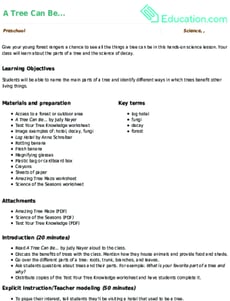Plants Lesson Plans
About Plants Lesson Plans
On Education.com, plants lesson plans help students explore core concepts such as plant needs (light, water, air, nutrients, space) and parts (roots, stems, leaves, flowers, seeds). These plans include hands-on activities like seed germination experiments, the 'rainbow flower' project (colored water in plant stems), and matching exercises that connect plant parts to distinct foods. Such activities make learning about plants interactive and engaging for various grade levels. Educators and parents can use printable worksheets and lesson plans to introduce students to plant biology through practical experiments.
Creative resources like plant part puzzles, seed starting kits, and interactive games help children understand plant structures and functions. These materials foster experiential learning while making science concepts accessible and memorable. Educators can incorporate activities that emphasize observation and scientific inquiry, supporting standards in biology, life sciences, and hands-on experimentation. Wing monarchs away from traditional textbooks with digital simulations and project-based lessons that integrate arts with science.
Learning about plants through hands-on activities saves educators and parents time by providing ready-to-use lesson structures that enhance student engagement. Classroom or at-home instruction becomes more effective with structured interdisciplinary activities. With a variety of resources on Education.com, students develop observation skills, understanding of plant growth cycles, and appreciation for natural processes. Using these materials makes teaching plant science both fun and educational.
Creative resources like plant part puzzles, seed starting kits, and interactive games help children understand plant structures and functions. These materials foster experiential learning while making science concepts accessible and memorable. Educators can incorporate activities that emphasize observation and scientific inquiry, supporting standards in biology, life sciences, and hands-on experimentation. Wing monarchs away from traditional textbooks with digital simulations and project-based lessons that integrate arts with science.
Learning about plants through hands-on activities saves educators and parents time by providing ready-to-use lesson structures that enhance student engagement. Classroom or at-home instruction becomes more effective with structured interdisciplinary activities. With a variety of resources on Education.com, students develop observation skills, understanding of plant growth cycles, and appreciation for natural processes. Using these materials makes teaching plant science both fun and educational.















